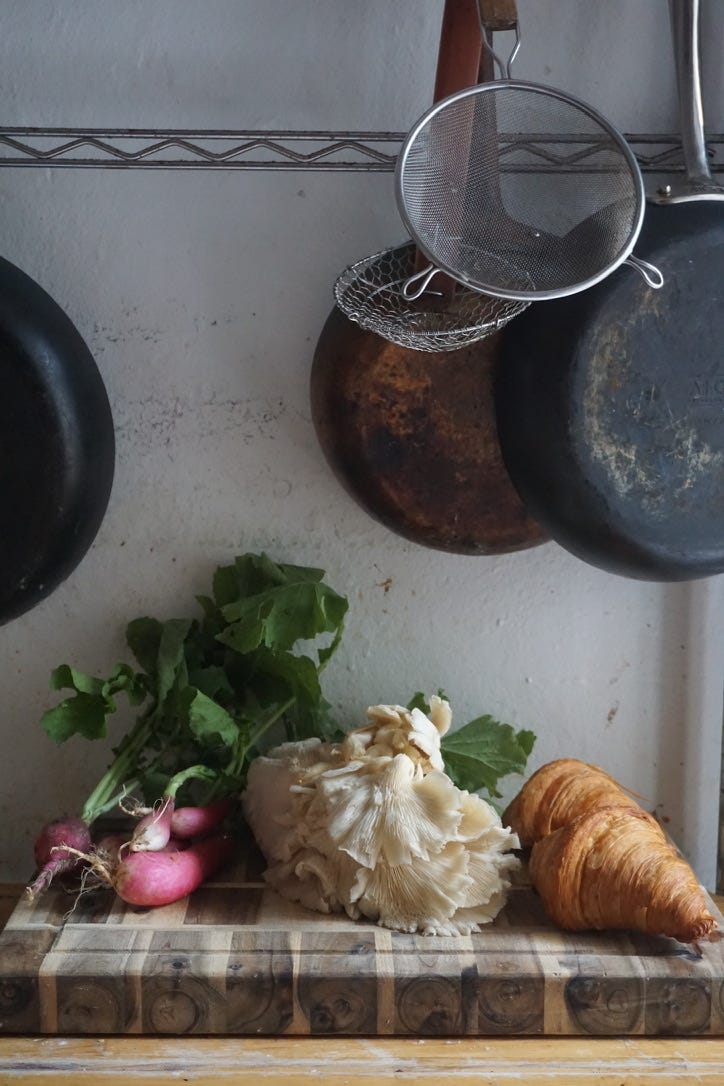Thank you for being a free subscriber to From the Desk of Alicia Kennedy. Paid subscribers keep these essays free and also support one contributor essay per month. In exchange, they receive additional posts on Fridays and join The Desk Book Club. If you’d like to know more about me, visit alicia-kennedy.com. How Do You Eat? No. 1Introducing a semi-regular series in which I ask food writers around the world how they stock their kitchens.I’m always nosy about the particulars of the mundane. I think most of us are, or else there wouldn’t be such massive industries built around watching people get ready for their days or make a sandwich. But what I personally really want to know about is how people stock their kitchens and pantries. Not just what’s in their kitchen, but how does the infrastructure of the city where they live and who they live with affect what they eat and how they go about getting it? Welcome to the first installment of “How Do You Eat?” featuring Lesley Enston, Gillian Longworth McGuire, and Apoorva Sripathi.Lesley Enston, author of the forthcoming cookbook Belly Full: Exploring Caribbean Cuisine Through 11 Fundamental Ingredients and Over 100 RecipesLocation: Brooklyn, New York, USA On how she shops for food: And now, I do the bulk of my shopping online through Amazon. Whole Foods. I hate it. And every day when I get the order, I get all the bags and I’m like I hate this. I started looking at other options and—this is what it is. I’m in Bed-Stuy, which has better food options than it used to, but they're still not great. When I go to the grocery store, if you want to get anything that's organic, it's so much money: a bunch of kale at my local grocery store that's organic is I think $6 now. At Whole Foods, it’s $3. That says it all. Everything that I look at is like that. The difference makes me kind of sad because I would certainly rather give local people business. I still do go to the farmers’ market when I can in the summers, summer through early fall. I do a CSA so that makes me feel good—the Central Brooklyn CSA, which is Windflower Farm. Obviously there's also the Caribbean element that I cannot get at Whole Foods. That is still a local endeavor. Luckily for me, I am in the southernmost part of Bed-Stuy, so I'm close to the Crown Heights grocery stores. Some of our grocery stores, like Foodtwon, have plantains and sour oranges and coconuts. All that stuff that I have to get on the ground. No matter what, the pantry is very important. On feeding her family while recipe testing: I think I did a good job because we were eating all the food; it was little food waste. I think that was helpful because in the beginning, I was still sort of shopping like I would normally shop and then realized very quickly that this was not a thing. I felt like more than usual, I would have to be shopping constantly: Okay, now today we're making this and I have to go get that. So that was kind of not fun, but that's okay. On how she cooks after writing a cookbook: Then I went through a period of, I want to cook other people's food that doesn’t have anything to do with the Caribbean. Like, I want Thai food. I want Korean food. So it really depends on the week. There are weeks where I'm all about the latest cookbook that I got and sort of planning out of that, and then there's other weeks where it's just a mess here and I kind of wing it. No matter what, the pantry is very important. I have a very, very, very stocked pantry—perhaps more stocked than other people. A recipe will call for tamarind paste and I’ve got it, because it’s normal for me. On eating out: Gillian Longworth McGuire, author of the newsletter Gillian Knows BestLocation: Venice, Italy On how she ended up living in Venice: On adjusting to her new city: Eating seasonally is enforced here. There is not a choice. On the price of food compared to the U.S.: On seasonal eating: It's completely different. If you've traveled in Italy before, you know: You go an hour away and you're not going to recognize the food you're gonna eat. So up here it's a lot of seafood. Completely different vegetables. Completely different climate. We're hundreds of miles away. On what she misses from Rome: On how food has changed in Italy: Apoorva Sripathi, author of the newsletter shelf offeringLocation: Chennai, India On how often she shops: Flours we buy from the same grocery store. Until a few years back, we used to buy grains of wheat and mill our own flour, but it's been difficult to procure really good wheat in the last few years, so we stopped the practice. My mother used to grind her own spice blends until a few years back, but now we buy our spice blends at the local grocery store. Rice, we alternate between a local rice seller and our grocery store, depending on who has stock. There's always at least four different types of rice at home: parboiled, raw rice, seeraga samba, karuppu kavuni, and red rice that we use depending on what we're eating. Fruits, we buy weekly from our fruit seller. Bananas are a staple and perhaps the only fruit we have on our tables throughout the year. Currently, I have strawberries and blueberries that he gets from Ooty, and mangoes from around the state. We also go to Pazhamudhir Cholai for fruits, which is a local grocery chain because they have a greater variety of mangoes. Sometimes, when my father goes back to his village, he brings lemons and citrons, banana flowers and stems from there. We also sometimes exchange fruits and vegetables with the neighbors depending on who has what and who needs what! One of our neighbors has a banana tree, so they give us bananas, leaves, stems, flowers, etc., whenever they have an abundance of it. After coming home, I've had to readjust the way I shop. On how she gets to the shops: On the difference between London and Chennai: In Chennai, I've spotted berries only recently (Pazhamudhir Cholai introduced peaches in 2021 and then it was promptly never to be seen again!) since the last two summers that passed. Frozen dumplings have become a reality, too, since the pandemic. Mangoes in London are available, but you need to know where to look. Mangoes in Chennai during summer—they are everywhere. So are bananas, and NOT Cavendish, which is a constant source of joy. After coming home, I've had to readjust the way I shop. Back in London, if I was missing an ingredient for dinner, I could pop into the corner shop or a supermarket and be sure of acquiring it, like cheese or bread or even some kind of dip. In Chennai, I have to either plan in advance or think of substitutions, which made me so frustrated at first, but now it's like little challenges in the gameplay until I meet the end-of-level boss, which I think is just life. On how she cooks: On her dream scenario: This Friday, paid subscribers receive From the Desk Recommends… my monthly roundup of links—written, audio, video, etc.—with a playlist, as well as a book giveaway. The next Desk Book Club discussion of Longthroat Memoirs: Soups, Sex and Nigerian Taste Buds by Yemisi Aribisala will be on June 28. Buy it from Archestratus for 20 percent off! If you’re looking for cooking inspiration, remember to scroll through The Desk Cookbook. NewsMy book No Meat Required: The Cultural History and Culinary Future of Plant-Based Eating will be out in paperback on June 25. Please consider a preorder! ReadingYou're currently a free subscriber to From the Desk of Alicia Kennedy. For the full experience, upgrade your subscription. |



